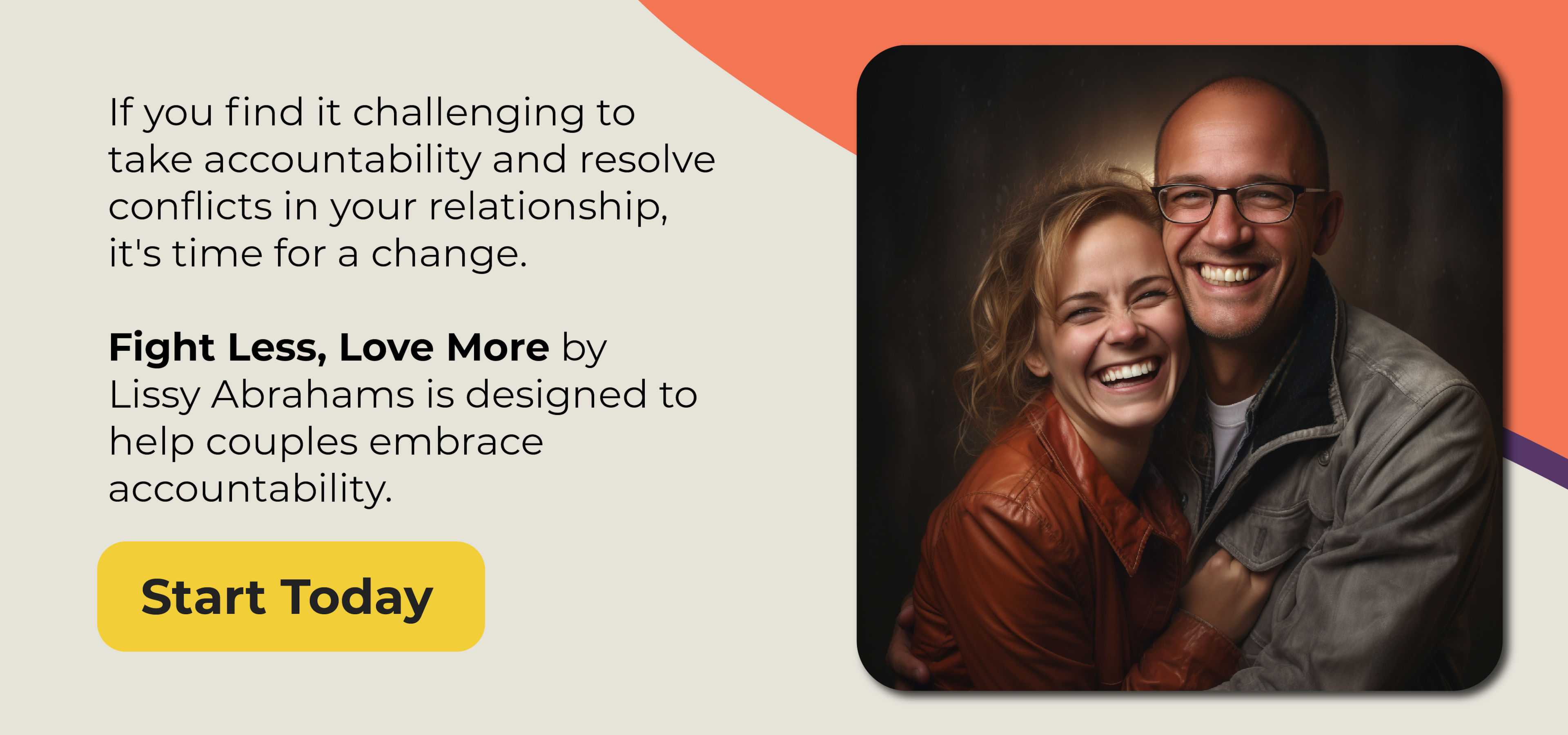How to Take Accountability in a Relationship: A Guide

When Jill and Harry first walked into my consulting room they were on the brink of separation. Their emotional intimacy was at an all-time low as the lack of healthy, transparent communication was tearing their once-thriving relationship apart. Yet, when they both learned how to take accountability in a relationship within themselves and to be held to account things immediately improved. Suddenly, their dynamic went from confrontation to collaboration.
I've seen this many times. When partners practice accountability, it profoundly transforms couple partnerships.
So, how can we follow in Jill and Harry's footsteps? Let's dive into the importance of accountability and explore practical steps for incorporating this vital relationship skill into our own lives.
Understanding Accountability in Relationships

In romantic relationships, communication is key, but knowing how to take accountability is just as important. This involves understanding yourself, your actions, and how they affect your partner. Personal responsibility in relationships has been emphasized by groundbreaking psychologists like Carl Rogers since the 20th century.
Accountability involves self-awareness, empathy, honesty, and emotional resilience. These qualities are cultivated over time, gradually changing how we see ourselves and interact with our partner.
To practice accountability is to step away from defensiveness, especially the all-too-human propensity to blame, and wholeheartedly accepting our role in the relational equation. Actively listening and engaging in self-assessment are crucial steps. This involves recognizing what's a deal breaker and understanding the consequences of our actions so we can foster mutual growth and create healthier relationship dynamics. It's a vital, transformative process that can fundamentally change the landscape at home.
So how exactly can we start this journey of becoming accountable in our relationship?
A Closer Look at the Role of Accountability in Relationships

Did you know that relationship accountability can break the cycles of blame and resentment? Often, disagreements tend to escalate into the blame game, causing emotional damage. Yet, understanding how to take accountability can change this dynamic significantly.
Taking accountability involves recognizing and admitting your part or misunderstanding. This recognition is not about self-flagellation or accepting all blame, it's about understanding that everyone contributes to a healthy relationship dynamic in some way and being willing to explore how your actions may have contributed.
This approach requires stepping out of a defensive mindset and adopting a growth-oriented perspective. It requires self reflection, the courage to own your actions and their impacts, even when it feels uncomfortable.
Relationship accountability becomes an invaluable tool for growth, fostering understanding, mutual respect, and most importantly, empathy. After all, when we begin to see and understand the impacts of our actions on our partner, we're better equipped to foster a relationship environment that's grounded in empathy and mutual respect.
Now, let's go through some benefits accountability brings to relationships.
The Problems with a Lack of Accountability in Couple Relationships
In a healthy relationship, taking responsibility and practicing accountability are crucial. Without these, partners may fall into the blame game, leading to a lack of mutual growth and a healthy environment. Failing to be completely honest can make one partner feel unheard, impacting self-awareness and meaningful change.
When partners hold each other accountable, they avoid the blaming game, fostering personal development. Lack of self-assessment and reflection can result in avoiding responsibility, making mistakes, and failing to apologize. This affects intimacy and overall support.
Proper accountability ensures partners respond appropriately, leading to healthier dynamics and stronger bonds.
Navigating Relationships: The Magic of Accountability
Case Study 1: The Importance of Accountability in Conflict Resolution

Sarah realized the importance of taking accountability. Instead of blaming her partner, she made a point of acknowledging her mistakes, which led to an open and constructive conversation. Being self-aware and taking ownership showed Sarah's empathy and led to reconciliation, creating a healthier relationship dynamic. The satisfaction and relief both partners felt after resolving their argument highlights the power of accountability in relationships.
Case Study 2: Accountability as a Pathway for Self-Improvement

Jamal was struggling with time management in his personal life, causing tension in his relationship. Recognizing his responsibility in causing this stress, he started implementing new strategies for better time management. Not only did this accountability led to improved personal skills, but it also brought about a positive change with his partner. Jamal's newfound sense of empowerment and the sense of relief his partner experienced is an example of the power taking responsibility has to significantly improve partnerships.
Case Study 3: Accountability Fostering Mutual Respect

In another real-life example, couple Hannah and Cara, recognized that their differing career aspirations were causing them distance. Hannah took accountability for not respecting Cara's career choices and promised to support her, which in turn made Cara more understanding of Hannah's aspirations. Both partners were aware and took ownership for their behavior that contributed to being distant, and they reconnected.
Practical Steps to Accept Responsibility in a Healthy Relationship
1. Identify Your Role
Recognize your part in the issue at hand. Even if it feels like the situation was out of your control, there's likely some aspect that you contributed to. This step involves honest introspection and self-awareness.
2. Express Apology or Regret
Acknowledge your mistake verbally to your partner. Say it sincerely – understanding and regretting your part. This step can foster an atmosphere of understanding and can be a catalyst for healing.
3. Acknowledge Your Partner's Feelings
Understand the impact of your actions on your partner. Show empathy and validate their feelings, without trying to justify your actions.
4. Offer a Solution
Make a commitment to correct your mistake. This might be a change in behavior, a promise to handle things differently next time, or taking actions to rectify a wrong.
5. Act on Your Word
Taking accountability isn't just about recognizing and apologizing, it's about making changes. Actions add weight to your words. By following through, you show that you're serious about accountability and respect for your partner.
6. Ask for Feedback
Discussion is vital in affirming accountability. Ask for your partner's perspective on your progress. This step can strengthen your relationship through open communication.
7. Patience and Persistence
Lasting changes don't happen overnight. Be patient with yourself and with your partner, understanding that growth takes time. Persistently follow this path of accountability for a healthier relationship.
Note: These steps are suggestive and not a one-size-fits-all formula. Every relationship is unique and it's important to adapt these steps according to your specific circumstances.
Taking Responsibility: Additional Reading

"The Power of Apology" on Psychology Today: This article explores how a sincere apology can repair harm, mend relationships, and heal emotional wounds. It emphasizes the importance of showing genuine remorse and taking responsibility for one's actions to foster reconciliation and trust.
"The Five Languages of Apology" by Gary Chapman and Jennifer Thomas: This book explores the different ways people give and receive apologies, enhancing understanding and accountability in relationships.
"Crucial Conversations: Tools for Talking When Stakes Are High" by Kerry Patterson, Joseph Grenny, Ron McMillan, and Al Switzler: This book provides tools and strategies for handling difficult conversations with accountability and empathy, crucial for maintaining healthy relationships.
"Taking Full Responsibility for Your Life" on Psychology Today: This article discusses the impact of taking responsibility in one's life and relationships, offering expert perspectives and advice.
Remember, continuing your learning journey about emotional intelligence and relationship dynamics can be a powerful tool to improve not only your relationships but your overall quality of life.
Frequently Asked Questions about Taking Accountability in a Relationship
What does taking accountability in a relationship mean?

Taking accountability in a relationship entails acknowledging your mistakes or missteps, accepting responsibility for them, and taking steps to rectify any harm caused. This process is about being honest, acknowledging your roles in conflicts or misunderstandings, and showing commitment to positive change.
How do you build accountability in a relationship?
Building accountability in a relationship can be accomplished by cultivating open and honest communication, setting and respecting boundaries, admitting faults and taking responsibility for them. Patience and persistence are also key, as change and growth take time.
How do you take accountability for hurting your partner?
To take accountability for hurting your partner, start by acknowledging your actions and apologizing sincerely. Aim to understand the emotional impact your actions have had on your partner and commit to change. Demonstrate this change in behavior over time to rebuild trust.
How to break up a relationship without hurting?
While it's hard to guarantee a hurt-free breakup, being respectful, transparent, and gracious can minimize pain. Prepare for the conversation, be clear yet kind in your reasons, allow them to express their feelings, and give them space after the conversation. Remember, it's essential to consider your partner's feelings and emotions during this challenging period.
Wrapping Up: Creating Trust and Understanding via Accountability in Relationships

In this journey to understanding how to take accountability in a relationship, we've explored various aspects. We've looked at the core essence of accountability, its significance in conflict resolution, personal growth, and fostering mutual respect. We've also shared practical steps for effectively assuming accountability in your relationships, backed by relatable case studies.
Taking accountability might seem challenging, but it fosters trust, understanding, and stability in relationships. By embracing this trait, you not only improve your relationship dynamics but also promote personal growth.
Ready to transform your relationships through accountability? Check out Fight Less, Love More, an online program by psychotherapist and relationship expert Lissy Abrahams. Sign up now to start your journey toward happier, more fulfilling relationships today.
Invest in Your Relationships Today
Are you ready to take the leap and transform your relationships? The journey requires work and dedication, but the rewards of happier and healthier relationships are priceless. With Fight Less, Love More, an online program by Lissy Abrahams, you can start your journey of growth today. Let's foster love, harmony, and understanding in your relationships. Don't wait. Act now to enjoy a more loving tomorrow.



